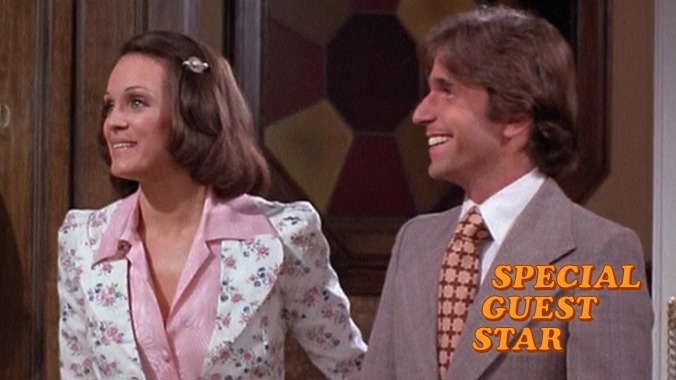Henry Winkler made his first big splash as Mary Tyler Moore’s uninvited dinner guest
Image: Screenshot: The Mary Tyler Moore Show
In Special Guest Star, Gwen Ihnat takes a look at a standout turn by a performer in a TV series, noting what effect the appearance had on the actor, the series, and the TV landscape overall.
The Mary Tyler Moore Show, “The Dinner Party,” season four, episode 10 (1973)
The Mary Tyler Moore Show was a landmark television series. It established the template for the workplace sitcom and featured a single woman whose life revolved around her friends—not a man or her family—fitting right into the women’s lib movement of the early ’70s. But if it had a single flaw, it was that its protagonist was almost too perfect. Mary Richards (Mary Tyler Moore) lived in an adorable Minneapolis apartment, was surrounded by devoted friends, and had a cool TV job where her coworkers worshipped the ground she walked on. Many episodes’ plots (perhaps, too many) involved a man in Mary’s orbit falling in love with her, from her friend Rhoda’s (Valerie Harper) boyfriend to her married coworker Murray Slaughter (Gavin MacLeod) to the guy who audited her. The most effective Mary Tyler Moore episodes showed the cracks in her highly polished façade (just one reason why “Chuckles Bites The Dust,” where Mary inappropriately loses it at a coworker’s funeral, is considered among the series’ best).
So the wise creative powers behind The Mary Tyler Moore Show—namely, James L. Brooks and Allan Burns—gave Mary at least one wholly relatable imperfection: She threw terrible parties. So terrible that one such gathering even broke up Lou Grant’s (Ed Asner) marriage. It’s delightful to see that even Mary doesn’t get it: She’s great at everything else. Why not this? So when Mary impulsively invites a congresswoman she’s just interviewed for dinner in the season four episode “The Dinner Party,” she’s determined to throw a successful soirée for once. For backup, she drafts happy homemaker Sue Ann Nivens (Betty White, in only her second appearance in what would become a career-making role) to cook an elaborate Veal Prince Orloff, and invites a handful of friends to help fill the six chairs of her dinner table.
When Rhoda impulsively brings a date, Mary’s party ends up with more guests than chairs. Fortunately, that date turns out to be the future Arthur Fonzarelli, Henry Winkler, in his primetime TV debut. The Yale drama graduate plays Rhoda’s recently fired coworker, Steve Waldman, who she’s brought to the party in an attempt to cheer him up. When Mary points out there’s no room at the table, Rhoda suggests setting him up at the little side table at the far edge of the room. The idea is so outlandish that it gets a hearty laugh from the studio audience—and with no other options, that’s exactly where Steve ends up.
Even in these less than ideal circumstances, Winkler shows great charisma and unflappability. With only a handful of lines, he’s an unexpected standout in the midst of one of the most successful TV casts ever assembled. If Steve was downtrodden or depressed, Winkler’s role wouldn’t have been nearly as effective. Instead, he’s constantly smiling and helpful, opening the door, gathering coats, but always greeting people with a matter-of-fact recitation of his employment status: “I’m Steve Waldman. I’ve just been fired.”
“The Dinner Party” is yet another example of the always relatable, humanizing element that helped make Mary Tyler Moore so successful: Even when we want everything to be perfect, there’s always something that will get in the way. And often that very thing—like Steve Waldman’s appearance—winds up being more memorable than any ideal outcome would have been. The episode’s biggest laugh comes when the party guests “ooh” and “aah” over the veal and Steve rises from his seat to take a peek from across the room. The second-biggest is when he politely asks someone to pass the salt over to his table, and Murray gamely delivers. “He not only held his own,” Betty White said of Winkler’s performance, “you found yourself watching him, and not necessarily the action at hand… we all kind of fell in love with him that week, and the audience fell in love with him that night.”
Unsurprisingly, Moore’s production company quickly brought Winkler onto episodes of The Bob Newhart Show and Rhoda, which no doubt contributed to his casting the following year on Garry Marshall’s Happy Days as the Fonz. As on Mary Tyler Moore, Winkler proved to be a scene-stealing attention magnet there as well: He started out at sixth billing, but soon became the star of the show.
Winkler wasn’t the only guest star to use The Mary Tyler Moore Show as a springboard: Winkler’s fellow 1970s ABC sitcom star John Ritter got a similar boost after portraying the tennis-playing pastor who officiated Ted and Georgette’s wedding. Such was the excellence of The Mary Tyler Moore Show that the series had a “rising tide lifts all boats” mentality; the creators and performers were generous enough to let an exemplary first-time guest star like Winkler stand out, ultimately clinching the success of the episode overall.
Even though Steve Waldman couldn’t have been more different than the role that would eventually make Winkler famous, he had a similar, relatable small-screen appeal; Winkler’s innate charisma could not be denied, sparking the beginning of a legendary TV career. Henry Winkler’s decade-long Happy Days tenure came to a close in 1984. To help break out of the “Fonz” role, the actor returned to guesting on myriad TV series—as disparate as Arrested Development (produced and narrated by his old Happy Days pal Ron Howard), Parks And Recreation, Numbers, and Royal Pains. This led to his most recent gig on Barry, which won him an Emmy 32 years after his first nomination. But his long TV journey had a humble but memorable start with a few lines, an infectious smile, and a simple request for salt.